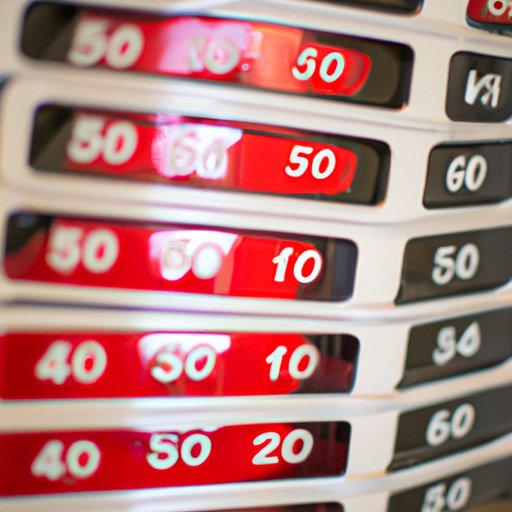I. Introduction
Have you ever needed to know how many pounds are in a gallon of water? The relationship between volume and weight can be confusing, especially when dealing with liquids. However, this information is crucial to many industries and daily life situations. This article will explore the conversion between gallons and pounds of water, as well as provide formulas, examples, and real-life applications.
II. The Relationship Between Pounds and Gallons
Before diving into the conversion between gallons and pounds, it’s important to define the terms. A gallon is a measurement of volume, while a pound is a measurement of weight. Conversion between these two involves understanding the density, or weight per unit of volume, of the substance in question.
For instance, 1 gallon of water does not weigh the same as 1 gallon of oil due to differences in density. To convert between liquid and weight measurements, you must take into account the specific density of the liquid.
Common conversions include:
- 1 gallon of water = 8.34 pounds
- 1 liter of water = 1 kilogram
- 1 fluid ounce = 0.0652 pounds
- 1 cubic yard of water = 1,681.65 pounds
III. Understanding Volume and Weight
The difference between volume and weight can be confusing, as they are two distinct properties. Volume is the amount of space an object occupies, while weight is the force exerted on an object due to gravity.
Water is often used as a standard for volume and weight measurements due to its known density. The volume of water is measured in gallons, liters, or cubic yards, while the weight of water is measured in pounds or kilograms.
To calculate volume, use the formula:
Volume = Length x Width x Height
To calculate weight, use the formula:
Weight = Volume x Density
IV. Exploring the Weight of Water
The weight of water is influenced by its density, which in turn is influenced by temperature and pressure. The density of water at room temperature and standard pressure is 1 gram per cubic centimeter.
However, the density of water can change with temperature and pressure. For example, cold water is denser than warm water, and water under high pressure is denser than water under low pressure.
The weight of water is used in various industries and applications, such as agriculture, construction, and manufacturing. It’s important to know the weight of water when calculating how much water is needed for a specific task or how much weight is added by water-bearing structures.
V. Demystifying the Conversion
To convert gallons of water to pounds, follow these steps:
- Determine the number of gallons you have. For example, 5 gallons of water.
- Multiply the number of gallons by the weight of 1 gallon of water, which is 8.34 pounds.
- The answer is the weight of your given volume of water. For example, 5 gallons of water weighs 41.7 pounds (5 x 8.34 = 41.7).
Use the following chart as a reference:
| Gallons of Water | Pounds of Water |
|---|---|
| 1 | 8.34 |
| 2 | 16.68 |
| 3 | 25.02 |
| 4 | 33.36 |
| 5 | 41.7 |
When making conversions, be sure to double-check your calculations and units. Common mistakes include confusion between fluid ounces and ounces, as well as between liters and milliliters.
VI. The Importance of Knowing How Much a Gallon of Water Weighs
Knowing how much a gallon of water weighs can be important in various situations. For example, farmers may need to know the weight of water to determine how much weight is added to their tractors when carrying water tanks. Construction workers may need to know the weight of water to calculate how much weight is required to keep structures stable.
Additionally, it’s important to understand other conversions, such as those between ounces and pounds or milliliters and liters. This can come in handy when cooking or when measuring ingredients for medication.
VII. How Much Does a Gallon of Water Weigh?
Finally, the answer to the question: How many pounds is a gallon of water? As previously mentioned, 1 gallon of water weighs 8.34 pounds.
It’s important to note that this weight can vary depending on temperature and pressure. For example, water under high pressure would weigh more than water under low pressure.
If you’re interested in learning more about how temperature and pressure affect the weight of water, there are numerous resources available online and in print.
VIII. Unlocking the Mystery
In conclusion, this article has explored the problem of determining how many pounds are in a gallon of water and has provided a solution through formulas, examples, and step-by-step instructions.
Understanding weight and volume conversions can be useful in many facets of life, from cooking and medication to construction and agriculture.
It’s crucial to double-check your calculations and units when making conversions to avoid common mistakes.
If you still have questions or want to learn more, there are many resources available to further explore this topic.
IX. Conclusion
In conclusion, knowing how many pounds are in a gallon of water is an important piece of information in many situations. This article has provided a solution by explaining the relationship between volume and weight, the difference between volume and weight, the weight of water, and the simple method for converting gallons of water to pounds.
